Washington's Blog - 11/13/14
Drug War? American Troops Are Protecting Afghan Opium
U.S. Marines with Fox Company, 2nd Battalion, 5th Marine Regiment, Regimental Combat Team 6, patrol through a poppy field on their way to Patrol Base (PB) Mohmon in the Lui Tal district, Helmand province, Afghanistan, April 17, 2012. The Marines joined with coalition forces at the PB to begin conducting operations in the area. (U.S. Marine Corps photo by Lance Cpl. Ismael E. Ortega/Released)
It is well-documented that the U.S. government has – at least at some times in some parts of the world – protected drug operations.
(Big American banks also launder money for drug cartels. See this, this, this and this. Indeed, drug dealers kept the banking system afloat during the depths of the 2008 financial crisis. And the U.S. drug money laundering is continuing to this day.)
The U.S. military has openly said that it is protecting Afghani poppy fields:
As Wikipedia notes:
Opium production in Afghanistan has been on the rise since U.S. occupation started in 2001.
Indeed, a brand new report from the United Nations finds that opium production is at an all-time high.
Common Dreams notes:
The cultivation of opium poppy in Afghanistan—a nation under the military control of US and NATO forces for more than twelve years—has risen to an all-time high, according to the 2013 Afghanistan Opium Survey released Wednesday by the United Nations.
According to the report, cultivation of poppy across the war-torn nation rose 36 per cent in 2013 and total opium production amounted to 5,500 tons, up by almost a half since 2012.
“This has never been witnessed before in the history of Afghanistan,” said Jean-Luc Lemahieu, the outgoing leader of the Afghanistan office of the United Nations Office on Drugs and Crime, which produced the report.
***
The U.S. military has allowed poppy cultivation to continue in order to appease farmers and government officials involved with the drug trade who might otherwise turn against the Afghan Karzai government in Kabul. Fueling both sides, in fact, the opium and heroin industry is both a product of the war and an essential source for continued conflict.
Public Intelligence has published a series of photographs showing American – and U.S.-trained Afghan – troops patrolling poppy fields in Afghanistan. Public Intelligence informs us that all of the photos are in the public domain, and not subject to copyright, and they assured me that I have every right to reproduce them.
We produce these photos and the accompanying descriptions from Public Intelligence without further comment.
Video, photos, and more: washingtonsblog.com


